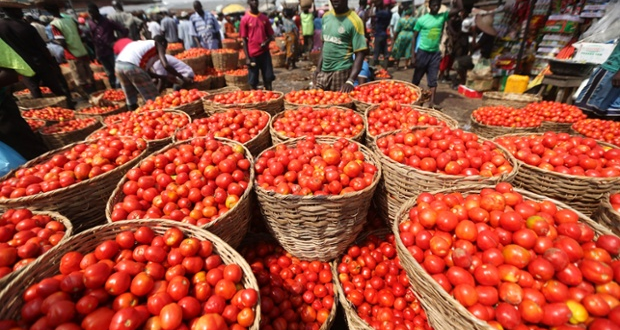
Insecurity Exacerbate Cost of tomatoes, Pepper – Traders
By Eric Adah- Makurdi
The prices of tomatoes and pepper in the North have continued to soar despite the items being in their seasons.
The development has reached an alarming level such that residents say thBYeir prices have stripped them to bare bones.
Most of the residents further groan that the prices of pepper and tomatoes have further hit the roof. According to a market survey by The Transmitter, some major markets in the northern states of the country like Kaduna, Gombe, Nasarawa, Kogi, Adamawa, Taraba, Benue and Sokoto are having tougher bargains between the buyers and sellers.
In Lafia, the Nasarawa State capital, residents lament over the cost of tomatoes and peppers. They urge the federal government to take proactive measures to arrest the situation.
Amina Suleiman, a housewife, told our reporter that a big basket of tomatoes, which cost 17,000 early January 2024, now sells for 65,000, while a bag of pepper that sold for 10,000 now goes for 52,000. She appeals to the government to take proactive measures to reduce the cost of these commodities that are very necessary in cooking.
Veronica Joshua, another housewife and mother of three, she said she has stopped cooking with either fresh tomatoes or pepper as the prices have continued to skyrocket beyond her reach:
“I decided to go back to using sachet tomatoes because the prices of fresh tomatoes have refused to come down. A small paint bucket measure of tomatoes which was sold for between 1,000 and 1,500, now sells for 8,000 and 10, 000. While a small paint-bucket of pepper which sold for 1,000 now sells for 4,000, she added.
Yakubu Ibrahim, another trader at the Lafia market explains that “many people are saying that it is our fault that the prices of tomatoes and pepper are increasing, but it is not so. We buy most of these cooking ingredients from Plateau and other States in the North Central region. And we sell almost the same amount we buy the items, because we are also considering the suffering of our fellow citizens.”
In Lokoja , Kogi State our reporter noted that a small basket of tomatoes sells for 11, 000 while a big basket sells for between 100,000 and 120,000.
Another trader Yusuf Abubakar, says “at the Cooking Ingredient market located along the jimeta- Girei Road, there were only traders selling tomatoes and pepper with no buyer to patronise them.”
A trader who identified himself as Hassan Umar disclosed that “a bag of fresh tomatoes now goes for 120,000. The big red pepper called ‘atarumbu’ now cost 55, 000 per basket. Four pieces of tomatoes go for 500. No tomatoes that can be bought for even 300 again” he added.
Usman Sani, another trader said getting tomatoes and fresh red pepper is a difficult task. He attributes the development to the prevailing insecurity in some parts of the North and the high cost of transporting the commodities. He says in the past “we got our large quantities of supplies from Benue, Niger, Plateau, kaduna, Nasarawa, kogi, Adamawa, and Taraba states, but now the cost of transportation and the insecurity in those states have caused scarcity of the commodities as most farmers who cultivate these commodities are sacked from their farm land by bandits and armed herdsmen. A restaurant owner, Joyce Teni says the development forced her to close her shop as tomatoes and fresh red peppers are now out of her reach.
Ibrahim, a tomato and pepper farmer in Kaduna state attributes the soaring prices across the states to insecurity and the outbreak of a deadly disease known as ‘sharon.’ He says farmers complained that the disease had resulted in the loss of millions of farms in the current farming season.
Report says the tuta absoluta, a moth farming specie, is a destructive pest that caused a national disruption to the tomato value chain in 2015. Ibrahim notes that the scarcity and subsequent hike in the price of tomatoes is unprecedented in the history of Nigeria: “early this year, during the small Sallah, tomatoes were sold at moderate prices. The scarcity is a result of lack of rainfall which led farmers to losses into millions of naira worth of tomatoes. As a result of this calamity, consumers fault tomatoes dealers of hoarding the commodities which is not the truth. You can’t hoard onions, tomatoes and pepper, because they are all perishable commodities.”
A driver who specialises in transporting these commodities, Hassan Lawal, complains that “we pay so much money to the security men at the different road blocks. You know we travel more at nights, these road blocks are many and they range from the road blocks mounted by the police, the military check points and touts or miscreants who say they are collecting the ‘due’ on behalf of the local governments.”
Painting a cursory picture of the sad situation, Hassan says “a trip from Zaria to Lagos for instance he encounters not less than 60 of such mounted road blocks at night and imagine what is left if the driver gives out 2000 at every road block and check point.The driver does this when going and coming, you do the maths. This is apart from the high cost of fuelling our trucks with petrol or diesel. So if we give out between 100,000 and 120,000 when going to a state like Lagos and still pay another round of money when returning , how do you expect the pepper and tomatoes dealer to make profits?
On the flip side, the farmers are appealing to the government to empower them, to go into all year round cultivation of tomatoes and pepper, and also tackle the insecurity in their respective communities for them to be able to meet up with the demand of these commodities.



